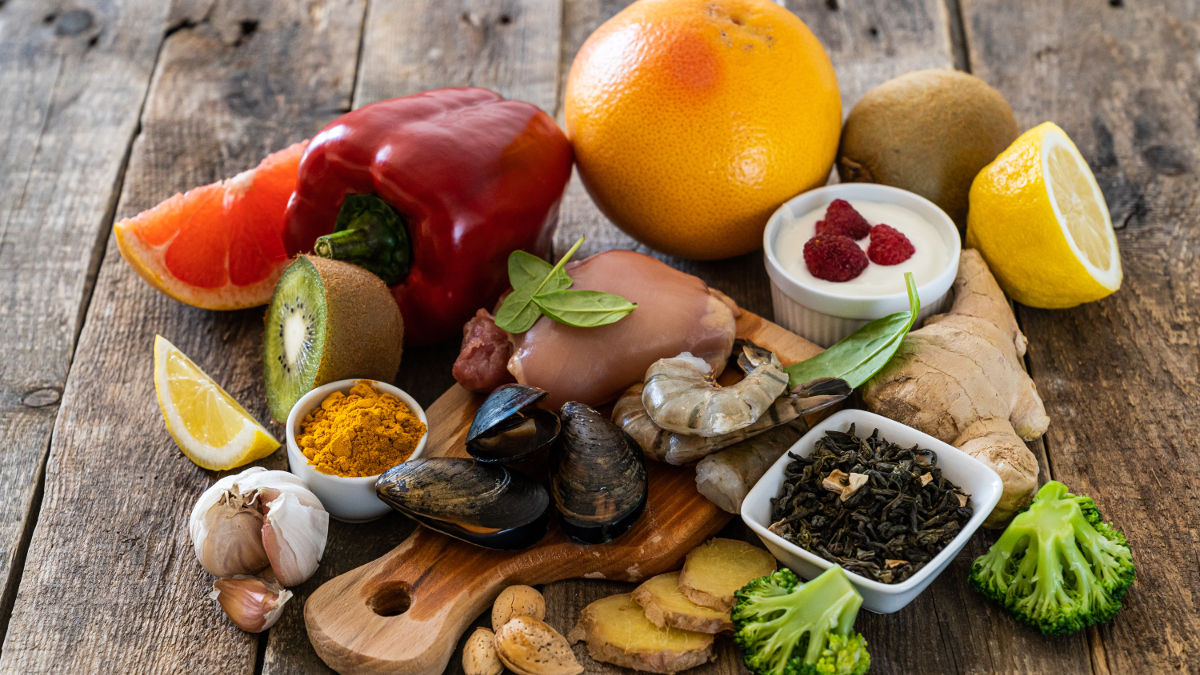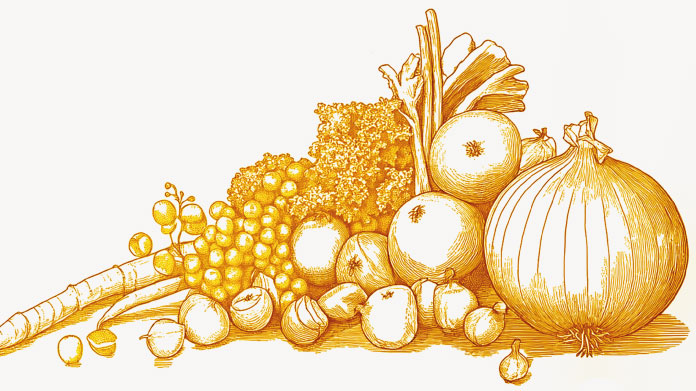7 foods to boost your immune defenses
Eating well is essential for improving your immunity. Follow our brief dietary guide for a tip-top immune system!

Boost your immunity with probiotics in yogurt
Yogurt is a fermented dairy product rich in probiotics such as lactobacilli and bifidobacteria. These microorganisms are naturally present in the body’s gut flora - an essential element of the immune system. By eating yogurt, we’re therefore helping to fortify our intestinal microbiota and improve our defenses against germs (1).
Other sources: all fermented foods, such as kimchi (Korean cabbage), sauerkraut and kefir, contain probiotics, and there’s also the option of taking probiotic complexes to help prevent infection, such as Probio Forte and Lactobacillus rhamnosus GG.
Nourishing your gut flora with prebiotics in garlic
But before probiotics, come … prebiotics. These probiotic precursors are also essential for maintaining healthy gut flora and thus strong immunity. Garlic is rich in prebiotics, and is also recognized for its antimicrobial effects. This superfood is even more effective in the form of aged black garlic (2). To get the most out of black garlic’s benefits, it’s best to take a highly-concentrated supplement such as ABG10+®.
Other sources: onions, artichokes, asparagus and chicory all contain prebiotics, as well as being rich in dietary fibre.
Reduce your risk of infection with vitamin C from citrus fruit
Vitamin C is one of the star nutrients of winter: a powerful antioxidant, it supports the immune system in several ways. In particular, it boosts the body’s tissue barriers and defense cells. (3) All citrus fruits are rich in vitamin C, with oranges richest of all.
Other sources: guava, peppers, kiwi fruit and cabbage all contain vitamin C. Alongside a diet high in fruit and vegetables, you could also opt for the convenience of a regular course of vitamin C (for example Asc2P).
Activate immunity with vitamin D from oily fish
Salmon, mackerel, trout … As well as being rich in omega-3, oily fish such as these are excellent sources of vitamin D . This vitamin is known for its ability to activate immune cell production. Studies have shown vitamin D deficiency can make the body more vulnerable to microbial attack (4).
Other sources : cod liver oil, milk and egg yolk also contain vitamin D. It’s also worth considering taking concentrated vitamin D3 in capsule form, as it’s particularly well-absorbed by the body (such as Vitamin D3 1000 IU).
Regulate microbial-triggered inflammation with zinc from shellfish
Zinc is a trace element essential for numerous physiological functions, including immune response. Inflammation is one of the defensive mechanisms used by the body to combat attacks but it’s known that a lack of zinc disrupts inflammatory messengers(5). Shellfish, especially oysters, contain a significant amount of zinc.
Other sources: zinc is also found in meat (beef, veal, lamb), and in sesame seeds. It’s worth noting that zinc is more digestible and bioavailable in its orotate form (so a good supplement choice would be Zinc Orotate).
Fight viruses with propolis
This beehive substance has been used for centuries for its ability to stimulate the immune system. Numerous scientific studies have confirmed its reputation to be justified. Propolis is, in fact, a powerful natural disinfectant, rich in flavonoids, which offers valuable antiviral activity (6). Green propolis is available in supplement form (Green Propolis).
Other options: all apitherapy (honey bee) products are good for your immunity. Honey, royal jelly (Organic Royal jelly 4 %) and even pollen can provide excellent daily support.
Boost immune cells with AHCC from shiitake
Shiitake mushrooms are not only delicious: once they’ve been fermented, they contain a considerable amount of AHCC - Active Hexose Correlated Compound. This compound stimulates the activity of natural killer cell lymphocytes, white blood cells that become hyperactive when faced with infection (7). This compound is available in the form of a pure extract (for example the supplement AHCC) for optimal effects.
These recommendations should in no way be seen as a substitute for medical advice if you are unwell. If in doubt, seek guidance from a doctor, via a remote consultation if necessary. Eating the right diet and taking appropriate supplements can, however, significantly help to boost your immunity, naturally and effectively.
References
- Elmadfa, I., Klein, P., & Meyer, A. (2010). Immune-stimulating effects of lactic acid bacteria in vivo and in vitro. Proceedings of the Nutrition Society, 69(3), 416-420.
- Nantz MP, Rowe CA, Muller CE, Creasy RA, Stanilka JM, Percival SS. Supplementation with aged garlic extract improves both NK and γδ-T cell function and reduces the severity of cold and flu symptoms: a randomized, double-blind, placebo-controlled nutrition intervention. Clin Nutr. 2012 Jun;31(3):337-44.
- Carr AC, Maggini S. Vitamin C and Immune Function. Nutrients. 2017 Nov 3;9(11).
- Mora, J., Iwata, M. & von Andrian, U. Vitamin effects on the immune system: vitamins A and D take centre stage. Nat Rev Immunol 8, 685–698 (2008).
- Liu MJ, Bao S, Gálvez-Peralta M, Pyle CJ, Rudawsky AC, Pavlovicz RE, Killilea DW, Li C, Nebert DW, Wewers MD, Knoell DL. ZIP8 regulates host defense through zinc-mediated inhibition of NF-κB. Cell Rep. 2013 Feb 21;3(2):386-400.
- In vitro antiviral activity of propolis, M. Amoros, F. Sauvager, L. Girre and M. Cormier, Apidologie, 23 3 (1992) 231-240.
- Ritz, Barry W.. “Active Hexose Correlated Compound (AHCC) and Immune Outcomes in Humans: A Review.” (2011).
Keywords
13 Hours
great products and prices
great products and prices
Marie
6 Days
Easy to navigate site
Easy to navigate site, had what I was searching for, good price. easy order-check out
James Tucker
12 Days
My skin is clearing up nicely!
Pretty good for my skin so far.
Christian
14 Days
The new packaging is excellent
The new packaging is excellent - finally! No more squashed boxes and torn envelopes.
GORAN
15 Days
Great Product
Great Product
Larry Garrett
19 Days
Quick shipping
Quick shipping; good price. No issues!
Mary McCarty
21 Days
Thr product is very good and is helping…
Thr product is very good and is helping me on my health. Then is always on time
LUGO Luz
23 Days
Buying was fine
Buying was fine. I had problems with the website not recognizing my login info, and had to call to get it fixed. Other than that, everything was good.
David S. Clark
24 Days
Your super maca and super ginseng are…phenomenal
Your super maca and super ginseng are phenomenal supplements that compliment each other when taking them together. Fantastic feeling of well-being and lots of mid day energy without the crash.
Keith Mason
26 Days
I have had amazing results with every…
I have had amazing results with every supplement I've purchased. I am extremely satisfied with this company
kirstin Torres
26 Days
Fine products
Fine products . They are on the leading edge of online supplements. The only issue -so far-is they sometime run out of subscription items.
Jason Argos
29 Days
The ordering process is very user…
The ordering process is very user friendly and the products always come in a timely manner.
CARTER Rhonda
30 Days
The price for Dr
The price for Dr. Pero's AC-11 is reasonable and in line with his views. (my former colleague). Keep it pure.
CAMPBELL Clayton
33 Days
Right on every time.
Right on every time.
Arthur Nicholas
36 Days
They are cheaper than everyone else and…
They are cheaper than everyone else and the shipping was fast. Great company.
Patricia Adams




